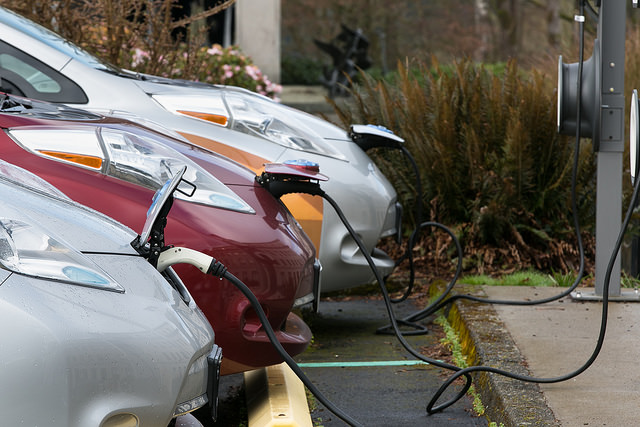

Photo by Washington State House Republicans is licensed under CC BY 2.0
The small South Carolina town of Seneca recently became the first municipality in the United States to make a complete switch to a fully electric municipal bus fleet. That’s big news! In fact, Seneca claims to be the first city in the entire world to have a bus fleet consisting solely of electric vehicles.
Seneca was able to take advantage of its proximity to Proterra, which is based in nearby Greenville. Proterra engineers worked closely with both the city and fleet operator Clemson Area Transit. Clemson University, with its International Center for Automotive Research, was also a partner all the way. When one looks for innovative public-private partnerships, this is certainly a good example.
Electric buses cost about $900,000 each, but each will save the city many times over the cost in reduced fuel expenditures. The expected lifespan for electric buses is 18 years. Additional benefits, of course, are related to a reduced dependence on oil, cleaner air and other environmental benefits.
California is also a leader in the switch to electric vehicles. Last summer, several governmental entities banded together in California’s Bay Area and made the largest single purchase of electric vehicles ever. The coalition purchased 90 electric automobiles that will save the entities more than $500,000 over the next five years.
Many will discount the significance of these examples because California is truly committed to environmental benefits and Seneca is a small town that was able to take advantage of its relationship with a local research college. But, Houston and Indianapolis and other cities throughout the United States are also aggressively pursuing electric vehicles.
In 2012, Indianapolis Mayor Greg Ballard announced his commitment to wean the city from dependence on foreign oil. Recently, Indianapolis made a deal that will give it the largest municipal fleet of electric vehicles in the country. By 2016, Indianapolis will have 425 non-police-pursuit electric vehicles and the savings will total nearly $9 million when compared to its former gasoline-powered automobiles.
And, in the heart of the nation’s petroleum industry, Houston boasts that it has the nation’s third-largest fleet of municipal electric vehicles. City officials began to make the switch to electric vehicles for the environmental benefits, but they’ve made the decision to ramp up the program because of the cost savings that come with less voluminous fuel purchases.
This trend is significant. Admittedly, many of the vehicles have been purchased by using federal incentive and rebate programs. But, the die is definitely cast. Municipalities nationwide are expected to continue switching to electric vehicles. The business case is strong and the list of cities announcing the switch is evidence that cannot be discounted. Follow our SPI Insights for the latest updates to this growing trend.
